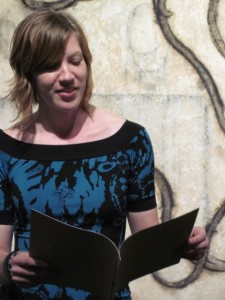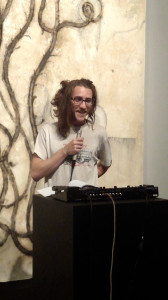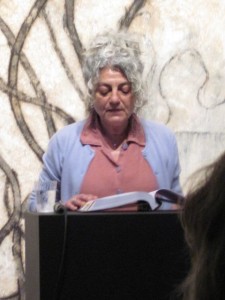Review by Pepper Luboff, Omnidawn feature writer
Who: Evan Karp, erica lewis, and Gloria Frym
What: Featherboard Writing Series, a text-based art event
When: Reading at 5 p.m. on May 4, 2013 (recurs monthly); A Trapped in Your Mind Feeling art show exhibited from April 5 to May 4 (new exhibitions monthly)
Where: Aggregate Space, 801 West Grand Avenue, Oakland, CA
Websites: www.featherboard.wordpress.com and www.aggregatespace.com
Contact: Steffi Drewes at skdrewes@aggregatespace.com
Pieces from each reader follow the review.
Just west of the 980 on Grand, Aggregate Space didn’t look like much from the street. But its outside belied its inside: passing through a close corridor filled with curatorial goodies, I entered the sleek, high-ceilinged, shotgun-style main gallery. On the night I visited, this room was set up for Featherboard, a monthly evening of text-based mixed-media performance in conversation with Aggregate Space’s visual art shows. Behind the reader’s podium hung Tim Armstrong’s “Sea Salt,” a massive drawing of an organic form somewhere between 20,000-Leagues-under-the-Sea squid and Jack-and-the-Beanstalk stalk. And from the podium, readers looked toward John Tronsor’s mesmermenacing video “Self-Portrait,” a face obscured and articulated by slo-mo flames or sheets of paper in eddies of air or scattering birds.
To the north of the main gallery a split-level formed the roof of a small screening room, where four shorts played: a Beckettian instructional video for digging a hole by falling (replayed with narrations in several different languages), 8-bit-videogame-like 3-D models of environmental and outer-space phenomena, a galaxy of tremulous and coagulating shards edited using horror flick techniques, and wringing hands overlaid with remixed audio of someone giving directions and someone else breathing heavily.
As people settled in, Featherboard’s organizer, Steffi Drewes, introduced the theme of the month-long exhibition and the evening’s reading. Held concurrently at Transmission Gallery and Aggregate Space, the exhibit was called A Trapped in Your Mind Feeling, and its pieces, curated by Lucy Puls, reflected the “pervasiveness of anxiety” in everyday life. For the reading, Drewes invited writers to respond to the theme of unease with existing or new poetry, prose, cross-genre, or cross-media work. So, I began to think of the gallery space as a large skull housing a dissociative identity disorder brain playing out different vignettes of agitation.First to speak into the disquietude was poet Evan Karp, director of Quiet Lightning and editor of Litseen.com. (I say speak instead of read because Karp recited mostly from memory.) After hooking up an audio looper, he prefaced his recitation by playing an answering machine message from his mother. In the message, left for Karp on his birthday, his mother jabbed him about aging, hair loss, and hair-growth products. Listening abstractedly, Karp twisted a strand of his hair as if to pull it out—a trichotillomanic cliffhanger.
From this unnerving springboard, Karp launched into his current project, Other People. He read in sotto voce, using the looper to layer the noise of his lines with an effect like backmasking, delayed playbacks, and simultaneous audio processing (Darth Vader under water, a muted Max Headroom, a low-volume backdrop of polyphonic Auto-Tune). These distorting audio effects both mimicked anxiousness (a stutter, a head cluttered with voices) and produced anxiousness (the sense of emergency created by technological disruption and the anxiety of not being able to understand, to organize chaos).
Even without the help of the looper, Other People was many voiced and multivocal; snippets of overheard speech bubbled up and folded back into a social goulash. The poems had the feeling of late-night conversations at the Gen-X&Y agora. Sometimes the alienation of a singular voice was heightened by its situation in a crowd. Other times, voices confirmed each other’s values, both mainstream and ex-stream, but in every case these attestations were suspicious. Implied and explicit questions of authenticity, integrity, purposefulness, and even goodness destabilized both masscult and counterculture positions. But, every once in a while, the ethos of Other People consoled itself with the promise of an imagination of beauty and love. Picture a Jules LaForgue 2.0, self-conscious of swagger, cool, and romanticized artsiness, and less exclamatory.While Karp’s reading was anxiety producing, the second reader, erica lewis, didn’t so much cause distress as lay bare an interior experience of susceptibility. Beginning with poems from murmur in the inventory (Shearsman Books, 2013), lewis anatomized the micro- and macro-emotional states caused by and causing injury, loss, and estrangement. The poems’ self-surgeries sliced back layer upon layer of different affective tissues, organs, bones, showing that feelings are never self-contained or homogenous. Within the inventory, self-castigation lives with self-soothing lives with fury lives with repudiation lives with accusation lives with self-identification lives with loneliness lives with numbness and detachment. There is no distinction between intent and impact, and fact and fiction, because all belong to the “messy reality” of feeling among other feeling beings.
lewis showed us that the interconnectivity of emotions makes them self-propagating in at least two different ways: emotions invest things with meanings that have the potential to prick further—“shards on your face account for all those references”—and memory churns up and reconfigures feelings through cycles of interpretation (the second arrow, ad infinitum) and forgetting—a continuous psychological self-mortification, or as lewis put it, a haunting.
Often in these first poems, the pain of meanings surfaced as wounds on the body—“memory or loss bores holes into you,” “wounds beneath the competence show your bones”—marks of both shame and ecstasy (in the sense of overwhelming emotion). These stigmata moments followed both literal and figurative threads: the connection between psychic injury and physical pain and the painful meanings attached to kinds of embodiment. A figure like Titus Andronicus’s Lavinia—mouth bleeding and hands “lost in the circuitry”—ghosted the poems. But unlike Lavinia, the speaker in lewis’s murmur not only wrote out the names of the perpetrators, but also sang and screamed (“you’re going to have to scream that it hurts”).
Continuing the strain of song and singing, lewis shared poems from her latest project, daryl hall is my boyfriend. Though the title of the collection sounded like a note scrawled in a girls’ high school bathroom, the poems pushed the edge of pop-song sentimentality to take on complexity. Each piece began with a lyric from Hall & Oates then cross-hatched the pop framework with the speaker-listener’s experiences of love, giving the songs a new volume. Poems like “some strings are better left undone” and “don’t you leave me sitting here in atlanta” excavated the surfaces of the Hall & Oates pop tunes to reveal richness within the songs and strata of fraught associations. The songs were triggers, mirrors, amplifiers, soundtracks, worlds, all desirous. And like murmur, the daryl hall poems revised the confessional, and clothed intricacy in the plain dress of conversational language.After a short break, Gloria Frym, associate professor of creative writing and literature at CCA, tempered the vulnerability of lewis’s work with her imperturbable wit. Reading from her new collection of short prose and stories, The True Patriot, Frym addressed the world’s problems with bemused critique, at once linguistically swerving and point-blank; if David Sedaris were a symbolist with a lyrical sensibility, he might write something like Frym’s Patriot.
Her first piece, “No I Won’t,” was a thumbnail sketch of social dissonance in the American cityscape, complete with an irritating dog, road rage, and mixed blessings. Many of the stories, in fact, featured either a pampered dog or a behemoth car, both reflections of human longing, arrogance, and delusion. The characters in Patriot clung to their miniature or oversize dogs and sport-utility vehicles to satisfy a range of emotional needs. But Frym noted, with both sarcasm and pathos, that others and things can’t fill the void. In “CSI SUV,” the main character’s dog was “not particularly affectionate,” and even if it were, “[Was] that really love?” Or was it a survival strategy capitalizing on sham affection and cuteness? In “Downtown,” a Cavalier King Charles Spaniel imitated the iambic pentameter of its owner’s heart and “[catered] to its owner’s desire for a perpetual baby,” but it couldn’t reciprocate the love of a human heart, of a human child. Ironically, Frym’s dogs and cars often even threatened instead of comforted: a car razoring corners or blasting loud music, a dog barking and growling.
In “Another Distraction,” Frym bemoaned the way social media distances us from ourselves and each other, making our social and emotional lives virtual, turning friends into “friends.” She described the interruptive pileup of “friends wanting to be verified as friends,” “pending friends,” and “suggestions for friends,” and the trifling comments these “friends” posted. But she also emphasized the cultural position from which social media and the critique of social media are possible; the piece “To Whom It May Concern,” listed the unrelenting human and environmental devastation that haunts the conscience of the first-world deep sleeper.Undergirding Frym’s direct, acid appraisal was a subtle attenuation of the proverbial into the primordial. Her short stories and prose pieces had this funny way of bringing reality into sharp focus and abstracting it at the same time; moods thickened and the prosaic turned odd, like a noirish Edward Hopper painting, except with a laugh.
With all these ways to consider and feel anxiety, I felt amped up, but in the best way possible. Featherboard’s combination of literary arts with performance and visual and sound arts made for a really charged and immersive arts experience. And the mixture of Evan Karp’s soundscapes, lewis’s powerful murmurations and songs, and Frym’s frank and funny prose was balanced, dynamic, and pleasurably perturbing.
Evan Karp
little dam
hallelujah hosanna into the night into the gaslights subsuming the atmosphere amber
(title) gaslight palaver rhymes with never takes the back seat proudly says nothing
peace everybody softly dear others come on kid it’s gonna be a long one
all of it becoming homeless all of it you put your head in the recycling bin
you never wash it you never get to wash it you use your head as a prop
it’s the middle of the afternoon it is precita on precita street dancing the precita
and you never get to wash it extra extra forget all about it lavender floss
honeycomb hairbrush with diamonday inlaws crocs for dogs comfort sole
cushiony afterlife over
i just booked a hotel for me and the poem for next october so we have to be together at
least that long at least like a hundred more pages over can we speed this up
sure but without a what turn it up more fucking poem yeah you lady
what are you lookin at hoggin all that poem in your purse i can see it on your face
admit me admit at least this much i will give you all 6 ideas of me they will rock
you to life they will rock you to sleep to life and to sleep to the lighthouse oblivious
luminary shine forth shine forth the community is right behind you dot your aye
aye dot your i wave your benefits proudly this is a nice part of town they
expect that here tombstone
erica lewis
you must be thinking something but you ain’t saying nothing *
hearing my way into yr words, my own, these songs
and we are so many pieces
and this feels like us trying to figure out the way to move on from it.
not to abandon it but to keep it in its place and figure out what’s next
the isolation and the small glimmers for a while
tracked the weather patterns
into fragile highs and lows.
the friction is …love that exists in parts / two surfaces in contact and always
moving
stopping and starting
so many decisions
and we come down to a critical tug between the logic
[the shift of stars without feeling them fade]
dear abstraction inherent in these constraints, i want to document the inaccessible and
uncomfortable to hold/ the little fictions we tell ourselves
[that suitcase of something with something inside
recorded from far away]
but if we know all we say we know
this is about devotion and
we’ve got to go somewhere else now to transmit that feeling
*“it’s a laugh”
Gloria Frym
Downtown



